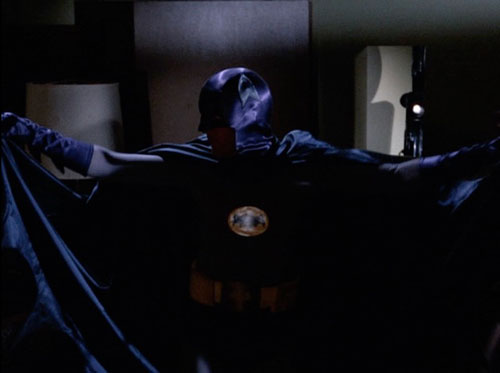Another great show, guys.
One thing I wish some historians would acknowledge is how DC's flirtation with the tone of the TV series was short lived; even as
Batman entered its third season, the comic took a well-received turn back to some darker storylines in the hands of writer Frank Robbins and artist Irv Novick, all before the Adams/O'Neil period. For example, take a look at the kind of subjects covered in
Batman #204 (August, 1968) and #206 (November, 1968)--


That's a far cry from Louie, Dr. Cassandra, surfing, Catwoman trying to be the queen of fashion and Londinium.
Weldon's history is interesting, and shines a light on comic fans not appreciating the '66 series take on the character while it was on ABC.
Of note is the reference to some fans feeling TV Robin was "too much" (I assume they meant the "holy-isms" more than anything else), which was echoed in the letters pages of Batman comics of the period, along with how much the readers supported the comic
not borrowing many of the TV series' hallmarks, such as...
Onomatopoeia (
Batman #195 - September, 1967)--

Bat-gadgets (
Batman # 206 - November, 1968) --

Robin's puns (
Batman #200 - March, 1968) --

Camp (
Batman # 206 - November, 1968) --

...but the letters pages also revealed strong support for the title to return to its darker roots. For example,
Batman #199 (February, 1968) --

I'm still digging through my Batman collection in storage, but I thought the samples fit right in with this week's show.
Regarding the '66 Batman being the end of heroism presented in--I guess--a straight way, I would point out that the entertainment industry never made a complete, hard shift from the traditional hero. For example, at the same time Steve McQueen starred as one of the most famous anti-hero cops in 1968's
Bullitt, on TV, Jack Webb continued to build on the image of cops as regular guys/heroes with the last couple of seasons of
Dragnet, and the September '68 debut of
Adam-12. In the seven years of Webb's good guy, traditional cop heroes on TV, movie cops were presented as being in conflict with the system (Gene Hackman in
The French Connection), tainted by being too close to criminals (Anthony Quinn in
Across 110th Street), along with other less than traditional cop characters. The point being that the entertainment industry (and American culture) embraced radically different versions of traditional heroes, but did not completely drop the idea of a straight-laced hero--certainly not with superheores such as Lynda Carter's Wonder Woman and Christopher Reeve's Superman--both successful in a decade overflowing with anti-heroes.










